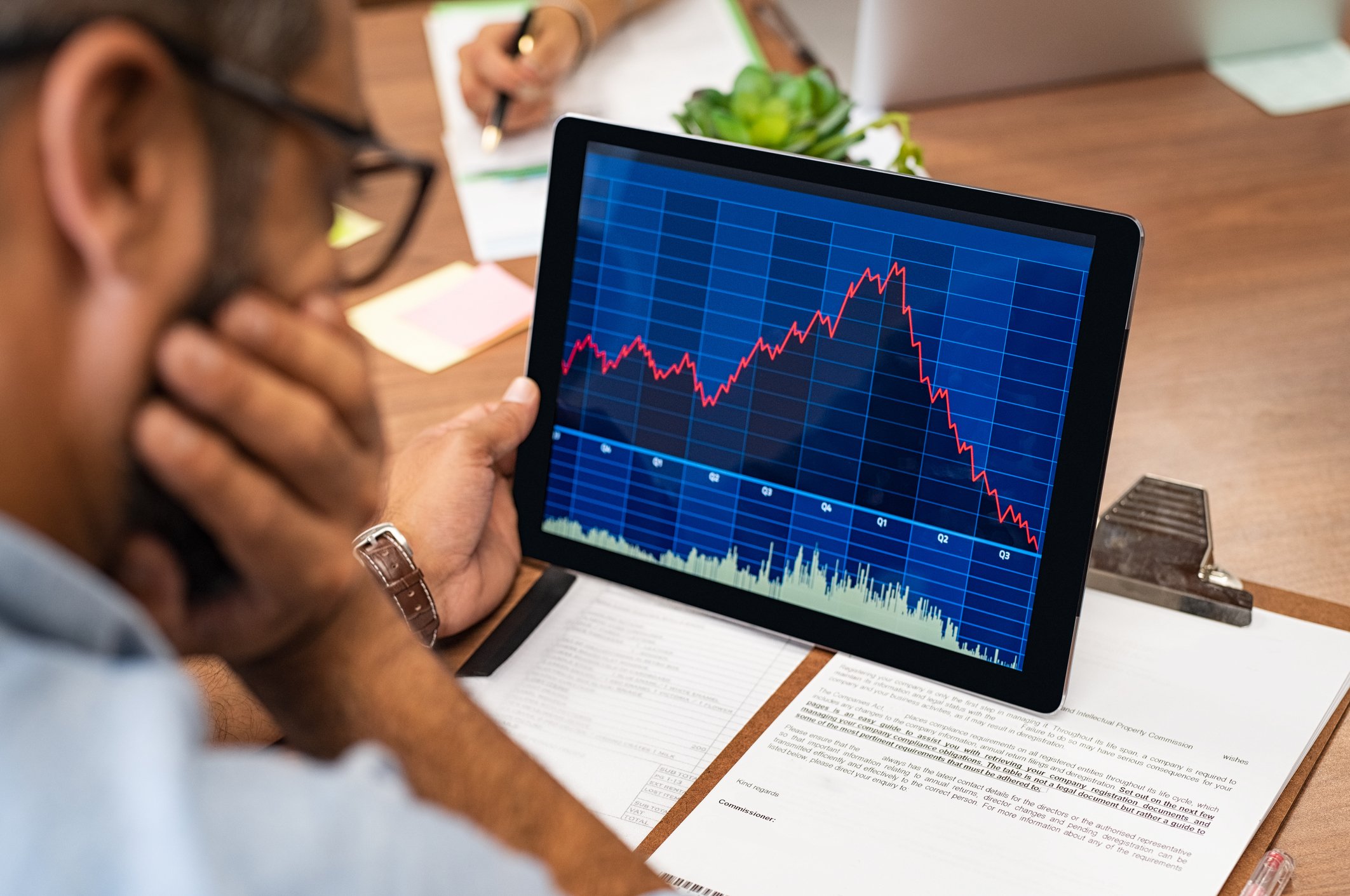Amazon.com (AMZN +2.63%) is well-known as the 800-pound gorilla of online retail, and despite the efforts of many large traditional retailers to get bigger pieces of the action, it continues to dominate. The 44% of online sales it made, however, only adds up to 4% of total retail sales.
In this segment of the MarketFoolery podcast, host Mac Greer and guests Matt Argersinger and Jason Moser of Million Dollar Portfolio dig into the numbers and the trends as they consider the future of retail and Jeff Bezos' powerhouse business. In particular, they consider the merits of one venture capitalist's thesis that Amazon will buy Target (TGT +0.14%) this year.
A full transcript follows the video.
This video was recorded on Jan. 3, 2018.
Mac Greer: Let's move on to Amazon. According to a new report, Amazon was responsible for around 44% of all U.S. e-commerce sales last year. That works out to about 4% of the country's total retail sales. Those numbers courtesy of analytics provider One Click Retail. Jason! What do you make of those numbers?
Jason Moser: I have to believe they are spot-on, though I would have probably guessed based on the number of Amazon boxes that ended up on my doorstep this holiday season that the number would have probably been a little bit higher.
Greer: Four percent seems kind of low to me.
Moser: It does seem a little bit low. But I think, we were talking about this before taping it, that 4% probably, we're trying to figure out whether or not this is the case, but I think that includes all retail sales, including things like fuel and restaurants, which are all included in that number.
Matt Argersinger: Exactly. So if you take those things out, because Amazon doesn't really sell those kinds of things, I think it's really closer to 8%. But for now, if you're talking about the total U.S. retail sales -- so everything, fuel sales, restaurant sales, sales of cars, 4%.
Moser: Yeah. And when you look at the fast growers, the parts of the business that are growing more quickly than others, it's impressive to see. These guys are selling a lot of stuff, whether it's groceries or even luxury beauty. We talked before about Ulta on our watch list in MDP. Amazon was certainly cited as a potential threat there. But I think when you look at the grocery opportunity alone, and this obviously goes back to their Whole Foods acquisition, total estimated grocery sales came in at about $1.5 billion in 2017 for Amazon.
Now, let's think about this for a second. Total supermarket sales in 2016 were around $670 billion. And that's a really low-margin business. So they're only scraping the surface there of the opportunity. I think this Whole Foods acquisition is really going to pay dividends for a long time at the company, just because that's such a repeat business. Everybody has to eat. Groceries are just one of those things. So I think they have a real opportunity there, not only to grow the grocery segment of the business, but also that private-label segment of the business, where it's Amazon Basics, you get your charger, cable, or batteries.
And man, I tell you, the one that's grown more quickly than anything else is baby wipes. And think about how many baby wipes you go through with just one kid, not to mention two. Apparently Amazon Elements, their private-label Amazon Elements baby wipes are just knocking it out of the park.
Argersinger: Yeah. Such good points. What really stuck out to me with the report is already what Jason mentioned, things like luxury beauty up 47% from a year ago. Pantry items up 38%. Grocery up 33%. Furniture up 33%. So if you look at look at these categories, I feel like five years ago, these were categories where consumers weren't looking to Amazon for. Household staples, cosmetic products, grocery. And now, they are. And there's a lot of reasons for that, but it just shows that there's been a broad expansion of Amazon's share of the consumer wallet. So if consumers are now looking to Amazon for these kinds of things, then you look at that 4% total figure and you're like, that's got to go higher, because to Jason's point, there's still tiny fractions of what those total categories are worth in terms of total retail sales. Amazon is just scratching the surface.
Greer: Jason, you mentioned the Whole Foods acquisition. I want to ask you about another acquisition. Tech analyst turned VC Gene Munster came out this week predicting Amazon will buy Target in 2018. He cited two reasons. He said the shared demographic and the manageable but comprehensive store count for Target. What do you think? Does Amazon buying Target make sense to you?
Moser: Personally, to me, no, not really. I'm not going to completely dismiss the potential of it happening. Gene's obviously a smart guy. It sounds like a little bit of a reckless prediction, so to speak. And I mean, we love those --
Greer: We don't do those on this show.
Moser: No, never! [laughs] And I think there's a point to be made there in regard to the demographic. That is a shared demographic. It's the human race, essentially.
Greer: I've heard of that.
Moser: Everybody from A to Z goes to Target, they use Amazon. So the demographic thing is probably a little less compelling to me. But I think, when you talk about a manageable store base, "manageable" doesn't strike me as being a reason to acquire a business like Target. I mean, that's essentially an acquisition that would be more than twice the size of the Whole Foods acquisition alone. And you don't want to hear on the call Amazon management saying, "Well, we know it's a big deal, but we feel like at least it's a manageable store base, and we could probably figure it out." I feel like this would be, on top of the Whole Foods acquisition, such a big and probably unnecessary acquisition. I would bet against it. But by the same token, I'm not laughing him out of the room.
I mean, I think Amazon has a million different ways to run. And honestly, I would rather see Wal-Mart and Target separate, and I want to see them succeed. Because as we've talked about before, their success basically keeps antitrust off of Amazon's backs.
Argersinger: Absolutely.
Moser: And so for Amazon investors, you'd rather see those companies stay on the road anyway, I think.
Argersinger: Yeah, I don't think a deal like this makes sense. If you look at why Amazon acquired Whole Foods, it really wasn't because Whole Foods has 300 grocery stores around the country. It really was because they were acquiring, one, a white-label food brand that Whole Foods has, and just to really boost their grocery inventory on Amazon Fresh. And that made sense to me. Buying Target? If you look at Amazon's network of fulfillment centers across the country now, that to me is the only angle, the reason you would buy a Target, is for inventory and distribution purposes. And Amazon has that now, nationwide. Even though it's a, quote, "manageable" store count, I really don't think Amazon is interested in acquiring tens of thousands of employees, all these retail locations that they now have to manage. It just seems like it would add too many headaches and it's just unnecessary.
Moser: We point to a metric all the time with internet businesses -- Amazon, Wayfair (W +0.93%), whatever -- revenue per employee. And they score because they're able to make so much more money per employee because they're relatively more capital light; they don't have to manage as many people and as many facilities. I do agree that Amazon is looking to get a little bit more of a bricks-and-mortar presence. Target seems to be a bit of a bigger one than I think even Bezos would want to take on at this point.
Greer: A few months ago, on Motley Fool Money, Chris interviewed Scott Galloway. He's an NYU business professor; he's written this great book called The Four. He predicted that Amazon would buy Whole Foods. This was a few months back, and at the time, he thought the next logical acquisition for Amazon is Nordstrom (JWN +0.00%). So if you had to bet on either Amazon buying Target or Amazon buying Nordstrom, what are you betting on?
Argersinger: I have to bet on one?
Greer: Yeah.
Argersinger: I think Nordstrom, for sure. Because Nordstrom provides something that Amazon's looking to get more into. If you look at their growth in luxury beauty, or their growth in fashion apparel, Nordstrom is a little bit more of a window angle into that world.
Greer: Malls are dying, though.
Argersinger: Malls are dying, but I think Nordstrom has a particular following, a particular quality and class to it that I think Amazon is interested in breaking into. I think when people think about high-end fashion or luxury apparel or really fancy department stores, they probably don't think of Amazon right now, or Amazon's brand. But they would, I think, with a Nordstrom. So I would definitely go for that over Target.
Moser: Yeah. It could easily be a far more manageable acquisition.
Argersinger: Much more manageable.
Moser: Considerably smaller than Target. And Amazon is making inroads into fashion. With that said, I really don't see either one of those companies becoming a part of the Amazon family anytime soon. As a shareholder, I certainly wouldn't want to see that happen anytime soon. I think it would be just a silly use of capital, honestly.
Argersinger: Yeah. The story with Amazon -- and I agree; I just don't think buying another big brick-and-mortar operation is the right thing to do -- the story with Amazon, I think Jason and I talk about it all the time, it's the value that customers are placing on their time now versus price. So if I can find something on Amazon that's even more expensive and I have to pay a little more for shipping, but it'll come to my house and I don't have to get in my car, drive, park, deal with people to buy something, I just feel like people in general, customers in general, particularly younger generations who grew up buying things online, time and convenience is so much more important to them than cost. They're not going to drive 10 miles to save 10%, even if Wal-Mart or Target or anyone else has a cheaper option. That to me is why I look at this 4% total U.S. retail sales number and, for so many reasons, particularly that, it has to go higher.
Moser: Yeah. Honestly, I'll tell you, the one acquisition I would like to see before any of those, it goes back to the performance that they chalked up here in furniture in 2017, somewhere in the neighborhood of $1.5 billion in furniture sold on Amazon. Wayfair is clearly a big winner in this space, and they have done a lot of good things here over the past few years since they went public. They're chalking up more than $4 billion in sales annually, and that's growing at a rapid clip.
I think there are a few reasons for that. But if you look at Wayfair, the stock price is detached from the fundamentals of the business. OK, we're in a big bull market, and that's the case with a lot of businesses. But Wayfair is taking a lot of plays out of the Amazon playbook. They're doing a lot of the same things that Amazon did in building out the fulfillment distribution. And it's a relatively capital-light business, because essentially it's a network just connecting furniture suppliers all over the country.
And the reason why Wayfair does so well is because, truthfully the shopping experience on Wayfair is superior to that of Amazon. If you're looking for furniture, shopping on Wayfair is a better experience than shopping for furniture on Amazon. I know. We've been doing this for the past year, Mac. I just moved, and I told you, we bought a vanity, we bought a toilet, and now I'm getting emails from Wayfair every day about wanting to buy another vanity and toilet, and I'm trying to figure out how many houses these guys think I have. But I think that would be a very manageable acquisition that I think would really fit nicely in with the distribution and fulfillment that Amazon already has, as well as the distribution and fulfillment that Wayfair has built out. Two very similar businesses focusing on very similar markets. I think it would be complementary.
I was truthfully a little surprised that Amazon didn't buy them before they went public. But that would be a deal that I would much rather see, as opposed to Nordstrom or Target.
Argersinger: Yeah. If you're thinking about the Zappos deal or the diapers.com deal, it's one where Amazon sees a niche retailer doing something much more effectively than they can, and going in and buying it. It makes much more sense.










